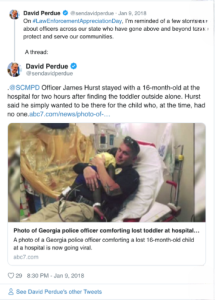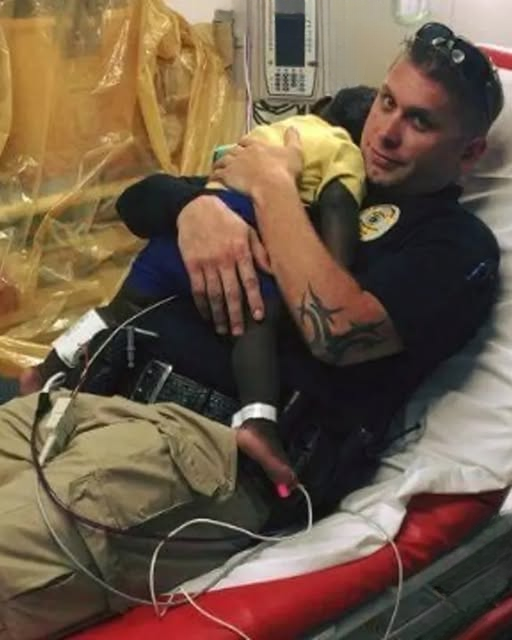Hospitals are strange places — sanctuaries of healing and pain, filled with life’s beginnings and endings. Their hallways echo with the clatter of footsteps, the hum of machines, and the quiet murmurs of people waiting for news that can change their lives in a heartbeat. Amid that environment, where human fragility is most visible, compassion often appears in its purest form.
It was in such a place — a local hospital on an ordinary afternoon — that a police officer’s instinct transcended his training, and a crying child reminded everyone present that humanity is not defined by uniforms or badges, but by empathy and care.
The child, barely more than a toddler, looked impossibly small against the vast white sheets of the hospital bed. Wrapped in a blanket too large for his tiny frame, his arms trembled as he tried to grasp the edges of the fabric for warmth and comfort. The sterile air of the room, thick with the smell of disinfectant and the distant buzz of machines, felt alien and cold.
His cries broke the silence — high-pitched, desperate, and heart-wrenching. The sound pierced through the rhythmic beeps of monitors, reverberating down the sterile corridors. It wasn’t the kind of cry that could be soothed with a lullaby or a soft pat on the back. It was raw and trembling — the sound of fear, confusion, and loss colliding inside a small, fragile body that didn’t understand what was happening.

The nurses tried their best. They moved gently, adjusting wires, checking vitals, whispering words of reassurance. But their professional calm could not ease the panic inside the boy’s heart. The bright fluorescent lights reflected off the polished floor, casting long shadows that seemed to stretch endlessly, making the room feel larger, emptier, more intimidating.
Every sound — the rustle of gowns, the clink of metal trays, the faint coughs and footsteps outside — seemed to make him cry harder. Hospitals are meant for healing, but for a child too young to understand, they can feel like prisons made of light and noise.
And then came the officer.
He stood by the doorway, still in uniform, the dull shine of his badge catching the light. His posture was firm, but his eyes — calm and observant — softened as he took in the scene before him. He had been through countless emergencies: car accidents, break-ins, domestic calls, even situations where he had to make life-or-death decisions in seconds. But this? This was something entirely different.
There was no threat to assess, no suspect to chase. Just a crying child whose pain could not be handcuffed or reasoned with. Yet something about the moment gripped him. The sound of the boy’s sobs hit a place inside his chest that his bulletproof vest could not protect.
As the officer watched, he felt a powerful pull — not of duty, but of instinct. A quiet voice within him whispered that this child didn’t need another nurse, doctor, or test. What he needed was something simpler. Someone to hold him.
The officer stepped forward. His boots made a soft sound on the floor, a contrast to the hurried movements of the medical staff. His tone was gentle when he spoke:
“Would it be alright if I held him?”
The nurses paused, surprised for a moment, then exchanged glances. They had seen fear in all its forms — but they had also seen how unexpected gestures of kindness could transform even the most chaotic situations. With a small nod, one of them said softly, “Of course.”
The officer removed his hat, placed it aside, and approached the bed. He looked down at the boy, whose face was streaked with tears, tiny hands clenched into fists of frustration and fear. Slowly, the officer extended his arms.
When he lifted the child, something shifted in the air. The crying didn’t stop immediately — but it changed. The sobs softened, broken by hiccups. The boy’s small head found a resting place on the officer’s chest, pressed against the firm fabric of his uniform. Beneath it, the boy could hear something steady, something rhythmic. A heartbeat.
For a child lost in an unfamiliar world of machines and strangers, that heartbeat was the sound of safety.
The officer, aware of his heavy gear and body armor, carefully sat on the edge of the bed. He adjusted his grip so that the boy could rest comfortably in his arms. The child’s fingers clutched at the fabric of his sleeve, as if anchoring himself to the only stability he could find in that moment.
The room grew quiet. The nurses continued their work, but slower now, almost reverently. Even the hum of the machines seemed to fade beneath the soft, rhythmic sound of the child’s breathing, now calm, steady, and peaceful.
Minutes passed.
The officer didn’t move. He didn’t speak. He simply sat there, rocking gently, his eyes distant yet tender. He didn’t know the child’s name or what had brought him here. He didn’t know whether the boy would be going home soon or facing more medical tests. None of that mattered. All that mattered was that, right now, this small, scared life needed warmth — and he had it to give.
Later, when someone asked him about the moment, the officer simply said, “It wasn’t something I planned. I just… knew he needed someone. That’s all.”
Those words carried a truth that went beyond the walls of that hospital. Compassion isn’t scheduled, trained, or commanded. It’s felt — an instinct that binds humanity together, reminding us that even in the most sterile, regulated environments, love can still breathe.
In that quiet room, stripped of rank, duty, and authority, the officer wasn’t a cop. He was simply a man holding a frightened child — a heartbeat lending strength to another.
The Weight of Empathy
As news of the moment spread — first through whispers among nurses, then through social media posts from witnesses — it struck a chord with people across the community. In a time when headlines often focus on division, violence, and mistrust, the image of a uniformed officer cradling a crying child became a symbol of hope.
People shared it online with captions like “Faith in humanity restored” and “This is what real heroes look like.” Others commented about how small gestures of kindness, when amplified, can remind the world that behind every badge, every title, and every label, there is a person capable of love and empathy.
The officer, however, didn’t see himself as a hero. When reporters later approached him, he smiled shyly and said, “I was just doing what felt right. You don’t need a badge to care.”
That humility resonated deeply with people. It reminded them that compassion doesn’t require authority — only awareness and willingness.
The hospital staff later reflected that after the officer held the child, something changed in the ward’s atmosphere. The tension that had hung in the air earlier seemed to ease. Other patients smiled more readily; nurses exchanged softer words; even the usual rush of activity seemed calmer. It was as if that one act of tenderness had rippled outward, soothing not just the boy but everyone who had witnessed it.
Behind the Badge: The Human Side of Service
For most police officers, the world sees only the uniform. People associate them with control, enforcement, and authority — not with nurturing, warmth, or care. Yet, those who wear the uniform often carry immense emotional burdens that come from witnessing life at its most fragile.
This officer, whose name the hospital later chose not to disclose to protect his privacy, had been on the force for nearly a decade. He had faced situations where empathy and toughness had to coexist. He had seen people at their worst — and sometimes, at their most broken.
But this moment was different. Holding that child reminded him why he joined the force in the first place. Not to arrest or enforce, but to protect. To serve not just the law, but the people living beneath it.
In interviews given months later, he said something that stuck with many: “Sometimes the hardest thing about this job is remembering that strength isn’t just about power. It’s about compassion too. That day, that baby didn’t need a cop. He needed someone to care.”
The Power of Presence
Psychologists later commented on the story, explaining why physical closeness and human warmth can have such a profound calming effect on infants and young children. The sound of a steady heartbeat, the rhythm of breathing, and the feeling of security can trigger a natural physiological response, lowering stress levels and slowing the heart rate.
But beyond the science, there’s a deeper truth — presence matters. In an age dominated by technology, where empathy is often reduced to words on a screen, being physically present for someone in distress is an irreplaceable gift.
That officer’s instinct — to reach out, to comfort, to hold — was a reminder of that. It showed that you don’t have to fix everything to make a difference. Sometimes, being there is enough.
A Lasting Lesson
Months later, the hospital framed a photo captured that day — the officer sitting quietly on the bed, the child asleep against his chest. The image now hangs in a quiet corner of the pediatric ward, with a small plaque beneath it that reads:
“Compassion is the heartbeat of humanity.”
Every day, patients, parents, and staff pass by it. Some stop to read the plaque. Others simply glance and smile. But for those who were there that day, the memory remains vivid — the silence after the crying stopped, the warmth in that cold hospital room, and the quiet realization that love can come from the most unexpected places.
The boy recovered, eventually discharged and reunited with his family. The officer returned to his beat, another day, another call. But for both of them, that moment left a mark — invisible, yet lasting.
The officer never saw the boy again. But sometimes, during his night shifts, when he’d hear a baby’s cry from a nearby home or a mother’s voice calling in worry, he’d remember. He’d remember the weight of that child in his arms, the trust that crossed between them, and how, for just a few minutes, the world had felt perfectly right.
And maybe that’s the real heart of heroism — not the dramatic rescues or the flashing lights, but the quiet moments when one human soul reaches out to another, offering peace where there was fear, warmth where there was cold, and hope where there was despair.
